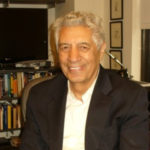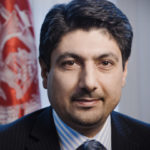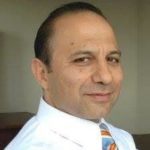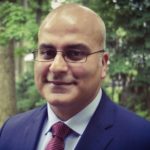HRF Presents: Achieving Peace – A Conversation on Afghanistan
George Washington University, Marvin Center – Washington, DC: November 8, 2018
 Mohammed Ishaq Nadiri is the Jay Gould Professor of Economics at New York University. A former department chair, he is also the founder and first director of the C.V. Starr Center for Applied Economics. Professor Nadiri was a signatory of the 2001 Bonn meetings where the interim government of Afghanistan was created. He also participated in the Tokyo meeting focused on funding Afghanistan’s reconstruction, the White House and UN Security Council meetings during Hamid Karzai’s visit in January 2002, and the Loya Jirga in Kabul in June 2002 that resulted in Mr. Karzai’s election as president. Nadiri served as Chief Economic Advisor to President Karzai from 2005 to 2008. For his services and accomplishments, President Karzai awarded Nadiri with the Ghazi Amanullah Khan, the highest civilian award of Afghanistan. In 2015, Nadiri received an honorary degree from the University of Nebraska, and he is listed in the “Who’s Who” in Economics.
Mohammed Ishaq Nadiri is the Jay Gould Professor of Economics at New York University. A former department chair, he is also the founder and first director of the C.V. Starr Center for Applied Economics. Professor Nadiri was a signatory of the 2001 Bonn meetings where the interim government of Afghanistan was created. He also participated in the Tokyo meeting focused on funding Afghanistan’s reconstruction, the White House and UN Security Council meetings during Hamid Karzai’s visit in January 2002, and the Loya Jirga in Kabul in June 2002 that resulted in Mr. Karzai’s election as president. Nadiri served as Chief Economic Advisor to President Karzai from 2005 to 2008. For his services and accomplishments, President Karzai awarded Nadiri with the Ghazi Amanullah Khan, the highest civilian award of Afghanistan. In 2015, Nadiri received an honorary degree from the University of Nebraska, and he is listed in the “Who’s Who” in Economics.
 Omar Samad is a Foreign Policy Analyst/Consultant. Ambassador Samad resigned as Afghan Ambassador-designate to Belgium, the EU and NATO in April 2016 prior to taking up his post. From December 2014 to January 2016, he was the Senior Advisor for Policy and Strategy to the Chief Executive of Afghanistan in Kabul. He was Senior Afghan Expert at the United States Institute of Peace from 2012 to 2013 during which time he conducted and published a survey of views and perceptions of Afghan political elites on the 2014 transition period in Afghanistan. Prior to that, he was the Afghan Ambassador to France (2009-2011) and to Canada (2004-2009), after serving as the spokesperson for the Ministry of Foreign Affairs (2001-2004). Ambassador Samad taught an Honors Seminar on “Radicalism Within Islam, Drivers and Policy Options” at the University of Maryland in 2017. Ambassador Samad has a Master’s Degree in International Relations from The Fletcher School and a B.A. in Communications from the American University in Washington, DC. He has lectured, written and spoke extensively on Afghanistan, South and Central Asia as well as other related topics since the 1980s. He has advocated for freedom and democracy in Afghanistan since 1979. He is a member of the U.S.-Afghan Women’s Council, the advisory board of The Kitson (based in Paris), the Fletcher School’s International Advisory Group, and Washington D.C.’s French-American Chamber of Commerce. Ambassador Samad is fluent in English and French.
Omar Samad is a Foreign Policy Analyst/Consultant. Ambassador Samad resigned as Afghan Ambassador-designate to Belgium, the EU and NATO in April 2016 prior to taking up his post. From December 2014 to January 2016, he was the Senior Advisor for Policy and Strategy to the Chief Executive of Afghanistan in Kabul. He was Senior Afghan Expert at the United States Institute of Peace from 2012 to 2013 during which time he conducted and published a survey of views and perceptions of Afghan political elites on the 2014 transition period in Afghanistan. Prior to that, he was the Afghan Ambassador to France (2009-2011) and to Canada (2004-2009), after serving as the spokesperson for the Ministry of Foreign Affairs (2001-2004). Ambassador Samad taught an Honors Seminar on “Radicalism Within Islam, Drivers and Policy Options” at the University of Maryland in 2017. Ambassador Samad has a Master’s Degree in International Relations from The Fletcher School and a B.A. in Communications from the American University in Washington, DC. He has lectured, written and spoke extensively on Afghanistan, South and Central Asia as well as other related topics since the 1980s. He has advocated for freedom and democracy in Afghanistan since 1979. He is a member of the U.S.-Afghan Women’s Council, the advisory board of The Kitson (based in Paris), the Fletcher School’s International Advisory Group, and Washington D.C.’s French-American Chamber of Commerce. Ambassador Samad is fluent in English and French.
 Wali Shaaker is a poet, novelist, and political scientist. He has served as an associate professor at the Defense Language Institute, a senior research analyst at Naval Postgraduate School, and president of the Society of Afghan Professionals in California. He has also served as a policy analyst at the RAND Corporation, Afghan media analyst with CENTCOM, and senior adviser to the NATO forces in Afghanistan. Shaaker has published a number of white papers, articles, commentaries, poems, and short stories in U.S. and Afghan publications. He is the author of “The River Village: A Tale of Struggle, Sacrifice, and Survival in Afghanistan,” “Democracy’s Dilemma: The Challenges to State Legitimacy in Afghanistan,” and “Separation,” a collection of poems in Dari language. In addition, Wali Shaaker has co-authored a book titled “Taliban Narratives: The Use and Power of Stories in the Afghanistan Conflict,” published by Oxford University Press. Currently, Shaaker is an analyst at the Department of Defense.
Wali Shaaker is a poet, novelist, and political scientist. He has served as an associate professor at the Defense Language Institute, a senior research analyst at Naval Postgraduate School, and president of the Society of Afghan Professionals in California. He has also served as a policy analyst at the RAND Corporation, Afghan media analyst with CENTCOM, and senior adviser to the NATO forces in Afghanistan. Shaaker has published a number of white papers, articles, commentaries, poems, and short stories in U.S. and Afghan publications. He is the author of “The River Village: A Tale of Struggle, Sacrifice, and Survival in Afghanistan,” “Democracy’s Dilemma: The Challenges to State Legitimacy in Afghanistan,” and “Separation,” a collection of poems in Dari language. In addition, Wali Shaaker has co-authored a book titled “Taliban Narratives: The Use and Power of Stories in the Afghanistan Conflict,” published by Oxford University Press. Currently, Shaaker is an analyst at the Department of Defense.
 Homayun Yaqub is a board member and Vice President of the Homaira Rahman Foundation, a non-profit dedicated to creating sustainable opportunities for Afghanistan’s orphans. Homayun is also a Senior Security Strategist with Forcepoint, a leading global cybersecurity firm. In this role, he partners with executives across various verticals to architect and deliver Forcepoint solutions to address human-centric business issues and better enable security/risk managers to safeguard their data and people. Prior to joining Forcepoint, Homayun was an Executive Director in JPMorgan Chase and Company’s Global Security team leading their Global Safeguard Program; a firm-wide initiative to analyze interactions between people, data, and their environment to mitigate current/emerging internal and external risks affecting the organization. Before that, Homayun held multiple leadership roles in the Department of Defense leading specialized threat and risk management programs addressing critical national security concerns. He was also a founding member of The MASY Group, a Washington D.C. based security and risk consulting firm supporting both public and private clients. Homayun began his career as a U.S. Army Officer serving at multiple locations globally. Homayun holds a Masters in Conflict Analysis and Resolution from George Mason University, and a Bachelors in International Business from James Madison University.
Homayun Yaqub is a board member and Vice President of the Homaira Rahman Foundation, a non-profit dedicated to creating sustainable opportunities for Afghanistan’s orphans. Homayun is also a Senior Security Strategist with Forcepoint, a leading global cybersecurity firm. In this role, he partners with executives across various verticals to architect and deliver Forcepoint solutions to address human-centric business issues and better enable security/risk managers to safeguard their data and people. Prior to joining Forcepoint, Homayun was an Executive Director in JPMorgan Chase and Company’s Global Security team leading their Global Safeguard Program; a firm-wide initiative to analyze interactions between people, data, and their environment to mitigate current/emerging internal and external risks affecting the organization. Before that, Homayun held multiple leadership roles in the Department of Defense leading specialized threat and risk management programs addressing critical national security concerns. He was also a founding member of The MASY Group, a Washington D.C. based security and risk consulting firm supporting both public and private clients. Homayun began his career as a U.S. Army Officer serving at multiple locations globally. Homayun holds a Masters in Conflict Analysis and Resolution from George Mason University, and a Bachelors in International Business from James Madison University.
 Rebecca Zimmerman is a Policy Researcher at the RAND Corporation and a doctoral candidate in strategic studies at Johns Hopkins University’s School of Advanced International Studies (SAIS). Her dissertation studies U.S. military institutions in Afghanistan, and the role bureaucracy plays in the implementation of military doctrine. Her work with RAND has focused on U.S. and international special operations, organizational culture, and security force development. Over numerous research trips to Afghanistan she has conducted extensive interviews of Afghan National Police and Army, assisted with early implementation of the Village Stability Operations (VSO) program, and studied the sustainability of international military assistance programs. As a Boren Fellow, she travelled to Mindanao, Philippines to interview both insurgents and Filipino and Malaysian military about the entrenched conflict there. Her work has appeared in the New York Times At War Blog, U.S. News & World Report, and on Al Jazeera America, BBC Radio, and CCTV, among others. Ms. Zimmerman graduated with honors from Stanford University and has an M.A. in strategic studies from SAIS. She is fluent in French, proficient in Indonesian, and has studied Russian, German and Farsi.
Rebecca Zimmerman is a Policy Researcher at the RAND Corporation and a doctoral candidate in strategic studies at Johns Hopkins University’s School of Advanced International Studies (SAIS). Her dissertation studies U.S. military institutions in Afghanistan, and the role bureaucracy plays in the implementation of military doctrine. Her work with RAND has focused on U.S. and international special operations, organizational culture, and security force development. Over numerous research trips to Afghanistan she has conducted extensive interviews of Afghan National Police and Army, assisted with early implementation of the Village Stability Operations (VSO) program, and studied the sustainability of international military assistance programs. As a Boren Fellow, she travelled to Mindanao, Philippines to interview both insurgents and Filipino and Malaysian military about the entrenched conflict there. Her work has appeared in the New York Times At War Blog, U.S. News & World Report, and on Al Jazeera America, BBC Radio, and CCTV, among others. Ms. Zimmerman graduated with honors from Stanford University and has an M.A. in strategic studies from SAIS. She is fluent in French, proficient in Indonesian, and has studied Russian, German and Farsi.







